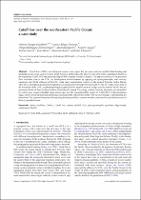Cutoff low over the southeastern Pacific Ocean: a case study
Metadata
Show full item recordAuthor(s)
Date
2021-02-17Collections
- Artículo científico [171]
Related Resource(s)
https://www.publish.csiro.au/ES/pdf/ES19051Abstract
Cutoff lows (COLs) are infrequent events in the tropics that can cause extreme rainfall, flash flooding and landslides in arid areas, such as western South America. In this study, the life cycle of a COL in the southeastern Pacific at the beginning of April 2012 was analysed using the ERA-Interim reanalysis dataset. This paper examines: (1) the precursor flow evolution prior to the COL, its development and dissipation by applying the quasi-geostrophic and vorticity equations; and (2) the influence of the COL in the heavy precipitation events over the western Peruvian Andes. During April 2012, the highest amount of precipitation was recorded in Chosica (850 masl) with 37 mm on 5 April. Days prior to the formation of the COL, a subtropical trough deepened by the amplification of a ridge over the tropical Pacific and the incursion of cold air from medium and low levels into the trough. The strong cyclonic vorticity advection was intensified by a short-wave trough embedded inside a long-wave one that strengthened the system on 5 April 2012. In the dissipation stage, warm vertical advection predominated, resulting in the reabsorption of the COL by a new trough. Understanding the behaviour COL systems is important for reducing the impact of these extreme weather events on lives and infrastructure in densely populated areas.
The following license files are associated with this item:








